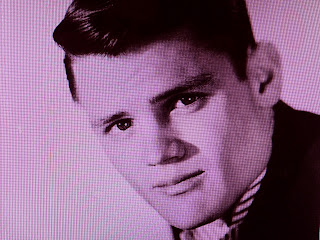I've finally got around to watching Bruce Weber's 1988 documentary on the life, loves and music of Chet Baker 'Lets Get Lost'. I began by dipping in and out of the film on You Tube and then watched the film in its entirety with PT. It's an excellent heartbreaking film; a meditation on beauty, pain and loss.
We see Baker towards the end of his life, still a relatively young man in his late fifties, but looking much older-looking, lost and confused. He's filmed in artful black and white at glamorous locations-the beaches of Santa Monica, the back of open-top Caddilacs and the Cannes Film Festival. Baker looks wracked with emotional pain. In some of the scenes he's surrounded by friends, family and laughing carefree 'beautiful people'. Weber has a knack of making them all look incredibly glamorous and star-like, all of which acts as a cruel counterpoint to Baker himself who looks sleazy more like a street person, a hobo. If they are Dorian Gray, he is their portrait in the attic.
 |
| My favourite collection of Chet Baker songs on the Pacific Jazz label. |
Weber tells the tale of his early life in Oklahoma, the handsome clean-cut young man, the madness he feigned to escape the army, the myths surrounding the loss of his teeth in a violent assault (a calamity for a trumpet player-he had to have dentures), his irresistible charm to women. There are interviews with his ex-wives, who all at some point wanted I think to rescue him caught up in grudging co-dependency, being used themselves and using him. The allure of the bad boy/object? We see his mother who admits tearfully, hesitantly that
yes he was a disappointment and we see his charming grown-up children who he hardly ever saw, including his sons who have inherited his good looks, though one suspects little of his wealth. There are noticeably few references to his father. Baker is at his most animated when talking about his drug addiction, enthusing about his favourite high; speedballs, a mix of cocaine and heroin which he's at pains to point out has to be mixed carefully in just the right proportions to attain the optimal high. When asked what was the happiest day of his life, people don't feature; he recalls the purchase of a new automobile.
 |
| 'I get along without you very well. Of course I do. Except perhaps in spring. But I should never think of Spring. For that would surely break my heart in two.' |
Chet Baker was naturally musical. He never had to work at playing the trumpet, he could play it a couple of weeks after picking it up age twelve. His voice had the same effortless ease and musicality, and most remarkably although the body aged terribly the voice retained its youth and innocence, barely changed right til the end. It's a strange voice, superficially easy on the ear, soft, gently lyrical and melodious yet oddly affectless and out of relationship. Its as if there's no-one there, no-one listening. Perhaps that was his unconscious conviction; no-one's there. It's this alienation and lack of connectedness that makes Chet Baker's music so powerful. Even with the more up-tempo numbers such as Always Look For The Silver Lining the music has an ache to it, all is tinged with melancholy, hinting at an unbearable yet unreachable pain. The music is blue, but isn't
the blues-there's no sense of resilience none of the humorous defiance of the bluesmen; just a world weary resignation; someone doing the best they can, hanging-in there, self-medicating on drugs, doing what they know and do best, singing and playing the horn. Paradoxically in spite of this the recordings have a peculiar intimacy; reduced to bystanders we bear private silent witness to his pain, the pain of someone who seems to be using song and melody to self-soothe. Little Boy Blue's jazz lullabies.
At the end of the film we see a confused, disoriented Baker at the Cannes film festival surrounded by hangers on and sycophants. He looks a little irritated but doesn't make a fuss. They eventually persuade him to sing. One for the road... Chet politely requests them not to talk during the performance, to be 'kind of quiet, cos it's that kind of tune' then gives a wonderful achingly sad rendition of 'Almost Blue' a song Elvis Costello wrote especially for him.
'now your eyes are red from crying. Almost blue...'
and as he sings you know this is his swansong, and when the credits rolled I found myself fighting back my tears, swallowing hard.


